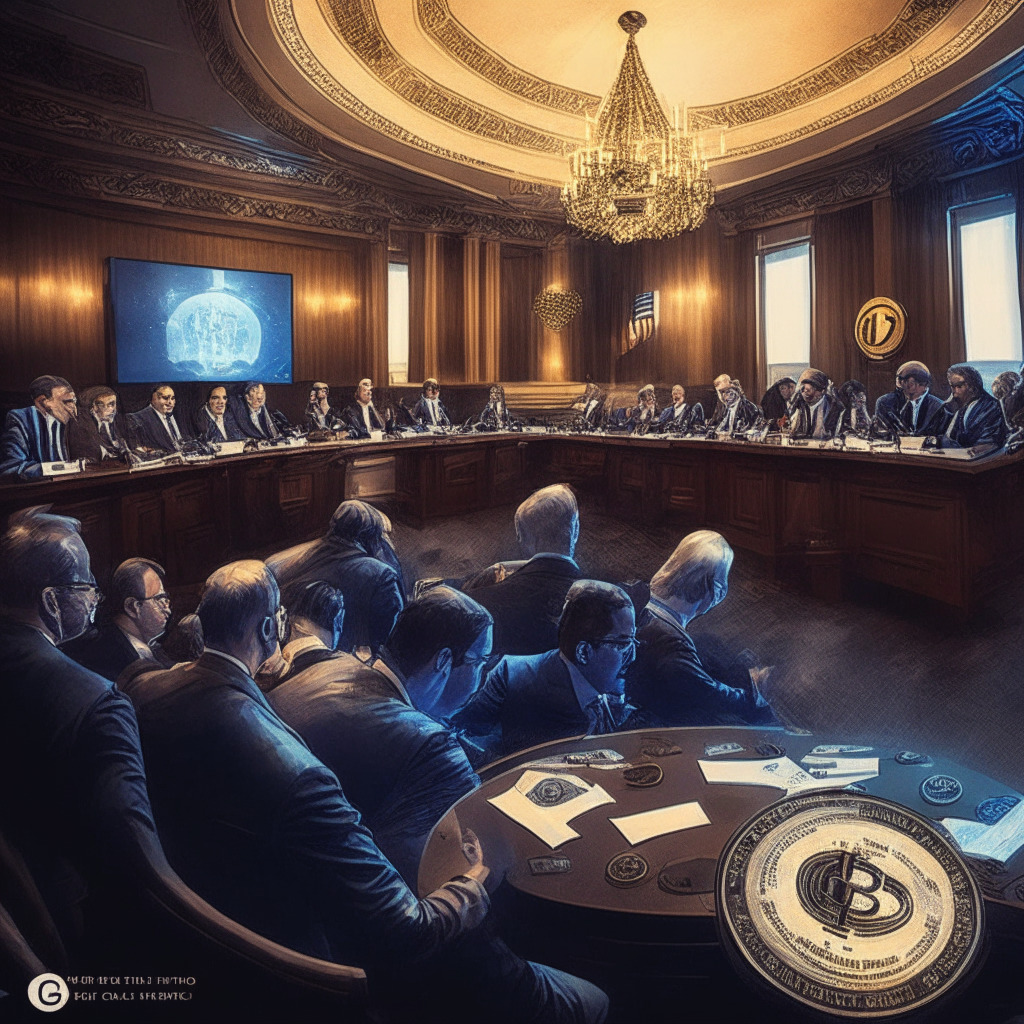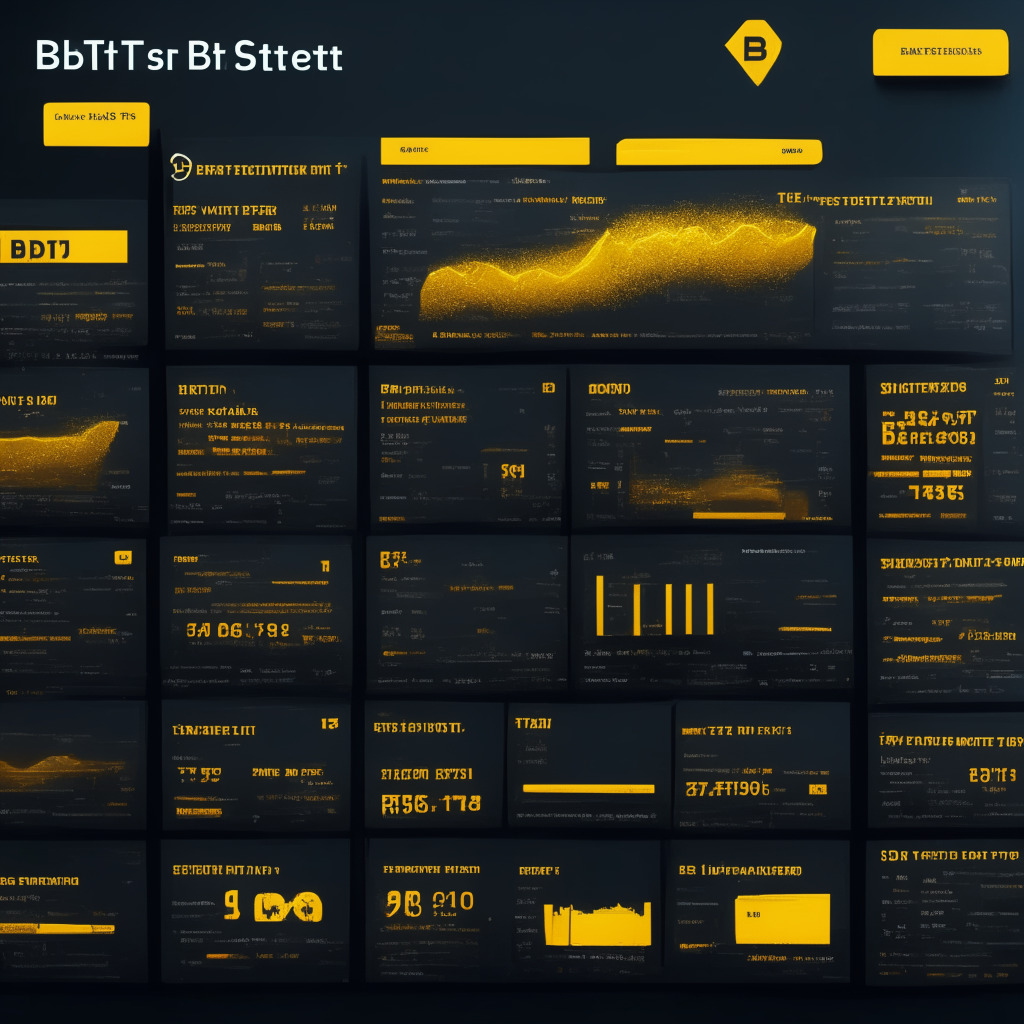The House Financial Services Committee discussed regulation of digital asset markets, focusing on crypto market structure and stablecoin regulation. Aaron Kaplan, CEO of Prometheum, stated that existing securities laws suffice for crypto regulation, echoing SEC Chair Gary Gensler’s viewpoint. However, some argue that the SEC’s current approach doesn’t provide a clear path for crypto exchanges.
Search Results for: MIT
Polygon 2.0: Unleashing Unlimited Scalability and Bridging Crypto’s Gaps in a Troubled Market
Polygon 2.0, an Ethereum-based Layer-2 scalability solution, aspires to democratize the global economy by creating a user-centric, equitable internet experience. However, uncertainty looms due to the SEC ruling on its native cryptocurrency, MATIC. The new iteration focuses on unification, infinite scalability, and leveraging Zero-Knowledge technology for seamless interaction.
eToro and Robinhood Limit Crypto Offerings: Impact on Market and Regulatory Challenges
eToro announced its U.S. customers will no longer be able to purchase Algorand, Decentraland, Dash, and Polygon starting next month due to the SEC’s increased regulatory oversight. The rapidly evolving regulatory landscape has also led Robinhood to stop supporting Cardano, Solana, and Polygon for U.S. customers. Both platforms highlight the challenge between innovation and regulation in the crypto landscape.
Mass Altcoin Price Drop: Scimitar Capital’s Liquidation Impact and Market Recovery Debate
The recent decline in altcoin prices has led to rumors about a crypto proprietary trading firm’s liquidation causing the dip. As market conditions remain volatile, crypto enthusiasts are urged to conduct thorough research and assess risk tolerance before investing in cryptocurrencies.
SEC Pressure on Crypto Exchanges: eToro and Robinhood’s Compliance Commitment
As the SEC increases regulatory pressure on cryptocurrency exchanges like Binance and Coinbase, major platforms, including eToro, emphasize their commitment to compliance and collaboration with regulators. This ensures access to a variety of asset classes for investors, shaping the crypto industry’s future while promoting investor protection and fostering innovation and growth.
NFT Inspect: Revolutionizing Twitter Engagement for Crypto & NFT Ecosystem or Limited Tool?
NFT Inspect, a Chrome browser extension, offers real-time tracking and engagement with popular NFT collections on Twitter. Users can search for NFT usage, analyze wallet addresses, and monitor community growth, aiding informed decision-making for investments. However, current limitations include only recognizing Ethereum, Polygon, and Solana blockchains and excluding video or GIF files.
eToro’s Commitment to Crypto Amid Regulatory Challenges: Protecting Diversification & Compliance
eToro recently reaffirmed its commitment to cryptocurrency markets and cooperation with global regulators amidst SEC lawsuits against Binance and Coinbase. The platform supports 80 cryptocurrencies and proactively reviews digital assets offered to maintain compliance and avoid regulatory conflicts. This collaboration between platforms and regulators is crucial for the future of the crypto industry.
Commonwealth Bank’s Crypto Payment Limits: Balancing Safety vs Market Growth
Commonwealth Bank (CBA) plans to reject or temporarily withhold specific payments to crypto trading platforms, setting a monthly limit of A$10,000 for customer payments to protect from scams. As regulations in Australia are considered, banks and governments strive to balance growing crypto interest with customer protection.
Australian Banks Limit Crypto Transactions: Balancing Security vs. Innovation
Australia’s largest bank, Commonwealth Bank (CBA), is declining certain payments to cryptocurrency exchanges due to potential scam concerns, following recent lawsuits against Binance and Coinbase. To protect customers, the bank plans to limit crypto exchange transactions and impose 24-hour holds, raising questions about security and the need for regulatory balance in the market.
Commonwealth Bank’s Crypto Limits: Balancing Customer Protection or Infringing on Freedom?
Commonwealth Bank of Australia (CBA) imposes a $6,650 monthly limit on customers sending funds to crypto exchanges, aiming to protect users from scammers exploiting interest in cryptocurrencies. The decision raises debates within the crypto community, questioning whether such regulations safeguard customers or infringe upon individual freedoms. The ongoing dialogue about appropriate crypto regulation levels will shape the industry’s future.
Blockchain Revolution: Balancing Benefits, Limitations, and the Path to Adoption
Blockchain technology offers unprecedented trust, security, and transparency in various sectors like finance and healthcare. However, limitations such as scalability, environmental impact, and regulatory concerns must be addressed for this emerging innovation to reach its full potential and revolutionize traditional models.
Upcoming US Financial Services Committee Hearing on Digital Assets: What to Expect
The United States Financial Services Committee has scheduled a hearing on June 13 titled “The Future of Digital Assets: Providing Clarity for the Digital Asset Ecosystem.” It aims to discuss critical issues concerning digital assets and provide clarity for the crypto community.
Mitsubishi UFJ’s Cross-Chain Stablecoin Platform: Potential and Challenges Ahead
Mitsubishi UFJ, in collaboration with Datachain, plans to launch a cross-chain stablecoin issuance and interoperability platform by 2024, targeting networks like Ethereum, Cosmos, Avalanche, and Polygon. The platform will enable stablecoin issuance, cross-chain swaps, lending, and payments, marking a significant milestone in connecting traditional finance with emerging blockchain technology.
Louis Vuitton’s Via Treasure Trunks: Luxury NFTs Meet Blockchain Limitations
Louis Vuitton’s Via Treasure Trunks collection introduces physical-linked NFTs in the luxury retail industry. By purchasing these exclusive digital trunks, customers gain access to future products, immersive events, and the brand’s growing blockchain initiatives. However, the non-transferable nature of these NFTs raises questions about resale potential and broad market impact.
Atomic Wallet Hack & Sinbad Coin Mixer: Anonymity Asset or Threat?
The $35 million Atomic Wallet hack involved stolen funds traced to Sinbad, a coin mixing service popular among North Korean hacker cell Lazarus. Coin mixers provide anonymity in crypto transactions, but their use for illicit activities poses challenges for law enforcement and regulatory measures.
US House Agriculture Committee Hearing: Balancing Crypto Regulation and Innovation
The US House Agriculture Committee’s hearing, “The Future of Digital Assets: Providing Clarity for Digital Asset Spot Markets,” aims to discuss legislation for regulating cryptocurrencies, with important figures like CFTC Chairman Rostin Behnam and Coinbase Chief Legal Officer Paul Grewal testifying. Balancing strict regulations and fostering innovation remains a challenge in shaping the digital asset industry’s future.
Crypto Anonymity Mirage: Shifting Narratives and Impact on Blockchain Adoption
The illusion of crypto anonymity persists despite the permanent, public record of blockchain transactions. However, increasing transparency and the growing acceptance of real identities will erode this image, fostering healthier growth and more widespread adoption of crypto and blockchain technology.
Debt-Limit Bill Impact on Blockchain: Future Hinges on Fed’s June Rate Hike Decision
Prominent economist David Wessel believes the Federal Reserve is likely to forgo rate hikes in June, citing positive labor market conditions, decreasing inflation, and the US averting a possible default situation. This aligns with sentiments expressed by Fed Chair Jerome Powell.
Binance Delists Privacy Coins in EU Countries: Balancing Anonymity and Regulation
Binance plans to delist privacy coins like Zcash, Monero, and Dash for users in Spain, France, Italy, and Poland starting June 26, 2023, due to local regulations. The move highlights the delicate balance between ensuring individual privacy and complying with regulatory frameworks in the crypto market.
AI in Blockchain Security: Potential and Limitations in Smart Contract Audits
Blockchain security company OpenZeppelin tested OpenAI’s GPT-4 model to discover smart contract vulnerabilities. Despite a reasonable success rate, the AI lacked reliable reasoning for security purposes, emphasizing the need for human auditors in assessing blockchain security.
AI vs Human Auditors in Smart Contract Security: Efficiency, Limitations, and Future Prospects
Blockchain security firm OpenZeppelin tested AI’s capacity to replace human auditors in smart contract auditing using OpenAI’s ChatGPT-4. While the AI model solved 20 of 28 Ethernaut security challenges, it’s not yet ready to replace human auditors. However, AI can improve auditor efficiency and detect vulnerabilities, indicating a potential for tailored AI models to enhance Web3 security auditing.
Balancing Blockchain Anonymity and Legal Investigations: Pros, Cons & Conflicts
Researchers from Friedrich-Alexander-Universität Erlangen-Nürnberg propose a standard framework containing five argumentative schemes for validating deanonymized data on the Bitcoin blockchain. This aims to balance protecting suspects’ rights and aiding investigators by providing transparent, analytically sound court proceedings and ensuring fair law application. The findings are potentially applicable beyond German and United States legal systems.
Binance’s Japanese Platform Launch: Compliance, Limitations, and Adoption Impact
Binance plans to transition Japanese users to a specialized local platform compliant with national regulations this summer. This move highlights the ongoing challenges and opportunities within the rapidly-evolving regulatory landscape for cryptocurrencies, ultimately paving the way for increased adoption and trust in the global market.
Bitcoin’s Growing Pains: Balancing Net-Zero Emissions Commitments and Crypto’s Future
Bitcoin mining’s energy consumption risks conflicts with global net-zero emission commitments, potentially leading to price decline and regulatory challenges. Governments should focus on greening their grids while the crypto industry embraces renewable energy and sustainable practices to stay on a secure footing amidst growing environmental concerns.
New Copy Trading Feature Brings 400% ROI: Leveling the Crypto Field or Limited Opportunity?
The new copy trading feature on Bybit allows investors to mirror experienced traders’ strategies, potentially leveling the playing field in cryptocurrency trading. Limited to 400 slots, the feature has an impressive ROI of 400% and a 90% success rate, offering users increased trading profitability and portfolio diversification.
Ethereum Anonymity Boost: Andreessen Horowitz’s Cicada Library Unlocks Anonymous Voting Pros and Cons
Andreessen Horowitz’s venture capital fund has released Cicada, a Solidity library that significantly advances anonymous voting on the Ethereum platform by preventing individual voter choices from being disclosed before polling ends. Combining Cicada with zero-knowledge group membership systems enhances voter anonymity, while addressing challenges in encoding blockchain votes, paving the way for more democratic voting systems within decentralized autonomous organizations (DAOs).
Balancing Crypto Regulation: Fostering Innovation vs Mitigating Systemic Risk
The European Systemic Risk Board report states that the current economic impact of the crypto industry is minimal, but recommends EU bodies to actively monitor and mitigate potential risks, particularly in leveraged trading, as the sector is growing and highly volatile. Cooperation between countries is essential for maintaining low economic impact due to cryptocurrencies’ cross-border nature.
Massive Baby Doge Token Burn: Addressing Exploitation Risks or Limiting Flexibility?
Baby Doge announces plans to burn 100 quadrillion tokens in a move to increase security and project integrity. The DAO-backed initiative aims to reduce exploitation risks, facilitate Ethereum bridging, and lower transaction fees, while addressing potential Binance Smart Chain disruptions.
Near-Term Crypto Market Growth Limited: Pros, Cons, and Balancing Act Amid Challenges
Cryptocurrency markets face limited near-term growth due to factors like low conviction and limited catalysts, according to Bank of America research. Despite uncertainties, traditional finance companies and tech firms continue developing blockchain applications, hinting at increased adoption and integration of cryptocurrency and blockchain technology in mainstream financial systems.
Innovative Advanced Limit Orders in DeFi: Exploring Opportunities and Weighing Risks
Mangrove, a Paris-based decentralized exchange (DEX), recently launched on Polygon’s testnet, featuring an innovative “advanced limit order” functionality. This allows trading intentions to exist on-chain as a programmable code without locking up funds, offering increased flexibility and options for DeFi traders in their transactions.
G7 Summit: Biden’s Crypto Opposition & Debt Ceiling Debate – Tax Implications & Future Regulation
At the G7 summit, President Joe Biden opposed a debt ceiling agreement allegedly favoring crypto traders through tax-loss harvesting, calling the terms “unacceptable.” The controversy highlights the need for a comprehensive regulatory framework addressing traditional finance and emerging technologies like blockchain and digital assets.
G7 Summit, Biden’s Disapproval & Crypto: Debating Tax & Regulation in Uncertain Times
During the G7 summit, President Biden criticized a debt deal for protecting wealthy tax cheats and crypto traders, while US Treasury Secretary Janet Yellen warned of catastrophic consequences if an agreement isn’t reached. This highlights ongoing tensions between supporting the expanding crypto market and ensuring fair responsibility, as the US debt ceiling deadline approaches and the future of crypto regulation remains uncertain.































